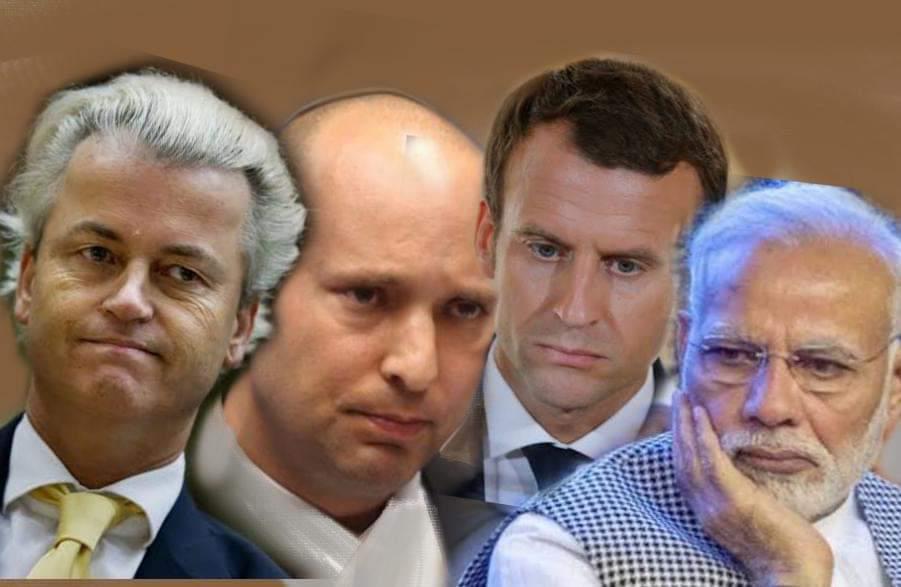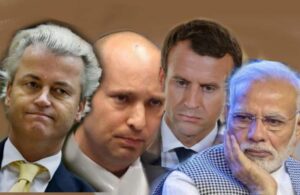Between Faithlessness and Culturalism: The predicament of Far-right
Huda Mohamed Shareef 13 July 2022
The far-right movements and parties around the world have many things in common, foremost of which is their Islamophobia and hatred against Muslims. The populist politicians who are part of this group are in power in different countries and are set to come into power in several other countries in the coming decades in Europe and elsewhere. While this phenomenon of Islamophobia is not restricted to the right- wing, with the most brutal manifestation of Muslim persecution carried out by a communist regime in China and anti-Muslim policies of a Marxist Govt. in Kerala, this article focuses on the unresolvable crises facing the far-right- the problem of faithlessness in God and traditional scriptural religions[i] they are seeking to uphold against what they consider as the ‘threat’ of Islam.
Christian far-right (even centrist) politicians and social leaders those oppose Islam and advocate for preserving the so-called Judeo-Christian values of Europe are mostly atheists and agnostic, meaning they do not have faith in the scriptural religion they want to preserve. How can anybody who does not believe strongly in something they wish to protect, protect it? The predicament far-right movement is facing all over the world is haunting them to the core. As a former anti-Islam Dutch far-right politician Joram Van Kleveren (who has embraced Islam few years back) puts it- ‘the secularization of Europe and mainly the north-western European countries like Britain, Netherlands, France etc. have lost religion (he is speaking of scriptural religions as secularism is in itself a different religion even though it is not addressed as such by liberals) and they really don’t have a clue anymore or knowledge about religion. Atheists in Netherlands comprise 51-52% of the total population, implying they form the majority’. One of the infamous Islamophobic Dutch far-right leader Geert Wilders who frequently advocates against what he, like many others call as the ‘Islamization’ of Europe is an atheist as Joram mentioned in his conversation with Paul Williams in blogging theology from an interaction he had with Wilders before Joram became a Muslim.
The cluelessness of one’s traditional faith-oriented religion is also the characteristic of Hindu far-right who are oppressing Muslims claiming that they are protecting their Dharma. But the problem is that, nobody among them have any idea of what it means nor do they have a practical definition of Dharma, given the fact that the name Hinduism is given by colonisers to an amalgamation of culture and traditions seen in the sub-continent.
One would wonder then what exactly are the far- right trying to achieve if they do not believe in their traditional faith? Therein lies their life’s dilemma. Even if Christians in Europe and America wish to counter Islam, they realise that it can’t be dealt with atheism or liberalism that has no values or fundamentals. They also increasingly feel infuriated due to inability to counter Islam with their traditional scriptural religion -be it Christianity, Hinduism or Judaism. The faithlessness in one’s scriptures is increasingly the case with even Christian priests who are seen accepting several vices of liberal immorality and normalising things contrary to the teachings of the scriptures they preach. Thus, in order to seek a solution to the predicamnet of faithlessness, the traditional religion is relegated to that of culture. This is a significant change because by this, the far-right everywhere among Christians, Jews and Hindus justify being secular and argue they are defending secularism. While few among Centre-left liberals might not agree to the right-wing argument on secularism, it is important to realise that there is truth in this rhetoric.
At the core of secularism is the separation of scriptural religion in shaping political ideology. With every religion curtailed down to the role of mere culture except Islam, the far-right continues to uphold their belonging to a particular cultural tradition while continuing to work within liberal philosophical and political paradigms. This apparently strange phenomenon is not strange given the central role of nationalism as the defining religion cum ideology of far-right, because it is nationalism that motivates them to embrace their traditional faith that is reduced to culture without faith or belief in God.
It should also be pointed out that the reason liberal-right continues to work according to political liberal models and governance system is due to the lack of a political ideology fit for the present era available in their respective religious scriptures. Thus, any religion except Islam is secular by their composition- that is they do not have a distinctive god centered political philosophy, which is why political thinker Shadi Hamid calls it the ‘Islamic exceptionalism’ in his 2016 book.
The far-right realises this deficit of their scriptural religions in providing an inclusive model of political system. They are however forced to act primitively and adopt the most intolerant and exclusive secular nationalism as their religion with cultural manifestations of their scriptural religions. Nationalism is a primitive form of socio-political organisation, because it is another form of tribalism[ii]. Revival of their traditions in order to create a national sentiment naturally then coincides with the customs and traditions of their scriptural religion even when they do not believe in it, ironically qualifying them to be secular.[iii]
The political system seen in every scriptural religion except Islam is the model of Monarchy, which cannot be implemented in a modern society. The Torah or the Old Testament talks about the kingdom of Solomon and David, Bible has the idea of kingdom of God which is considered as the central teaching of Prophet Isa/Jesus (A.S) by many Christians and the Hindu scriptures talk about the kingdom of Ram or of other historical heroes.
The right-wing in the U.S who are considered as the conservatives are coming to in terms with a cultural upliftment of Christian traditions without faith. In a recent article published in ‘The American conservative’, leading Catholic conservative thinkers Sohrab Ahmari, Gladden Pappin and Chad Pecknold rightly states that “cultural Christianity is a religion supposedly divested of the element of faith and deployed to secular ends”. Despite realizing that this aspect called cultural Christianity is widely being publicized by right-wing populist leaders in Europe and America by the likes of Victor Orban, Matteo Salvini, Emmanual Macron Donald Trump etc.- who all have values and deeds contrary to the teachings of the Christian faith and scriptures- the thinkers are arguing to defend this cultural manifestation of a divine origin faith without its faith element. It is also worth mentioning the meltdown Emmanuel Macron of France is exhibiting due to his contempt for Islam (instead of simply using the term Islam, he like many liberal politicians are cunning enough to label it as ‘political Islam’ or ‘Islamic radicalism’) since the past few years. While the French state is terrorizing Muslims with its secularism, Macron has done many overtures towards the catholic church recently to the extent of claiming to ‘mend the damaged link between church and the state’. Macron is also committing to allocate funds to many Christian schools in Arab states. This is because as mentioned earlier, they have no other choice but to embrace a skeleton of their scriptural religion manifested with culturalism due to the identity crises they are facing. Not to miss out that these actions of Macron in increasing relation with Christian institutions is also defended as secularism.
The conservative thinkers in their essay also admit that “cultural Christianity is insincere and hypocritical, tawdry and chauvinistic”. But at the core of their compulsion to embrace this form of Christianity with all the vices mentioned is due to the failure of political liberalism and identity crises.
This aspect of cultural Christianity is not just the case with Christianity. This is what is embodied in Zionism and Hindutva- cultural Judaism and cultural Hinduism respectively. The definition of cultural Christianity very well bodes with cultural Judaism and Hinduism- that the far right in Israel and India are appearing to be more ‘religious’ is due to their upholding of their dominant culture rooted in their scriptural religions without any faithful commitment to it or piousness. The prominent thinkers of Hindutva namely M.S Golwalkar and Savarkar were atheists/agnostic who argued for the manifestation and assertiveness of ‘cultural Hinduism’ or sanatan dharma as they call it. A good number of Hindutva nationalists identify themselves as ‘savarkarite atheist’. Similar to some Christian priests, there are many Hindu priests who do not believe their holy scriptures had a divine origin. They simply identify it as part of their tradition and culture, forcefully imposing on themselves as a result of inferiority complex with regards to Islam.
Coming to Judaism, the phenomenon of cultural Judaism is widely being recognized among Jewish population everywhere and in particular Israel. The Torah clearly forbade killing and displacement of people from their lands but Zionism which embodies Jewish culturalism act completely opposite to their scriptures. As an article on cultural Judaism suggests “there are a growing number of Jews who identify themselves as cultural or secular rather than religious”. The article also mentions about a book written in 2012 by Rabbi David Goldberg titled ‘This is not the way’ where he points out (rather in a positive undertone) the faithlessness among Jews. In it he states that most Jews, even many synagogue-goers, are no longer motivated by belief in God. There are also several studies conducted among European and American Jews that affirm this reality of faithlessness and disbelieve in God among the community. A large number of Jews who do not have faith in Jewish religion or belief in God are also Zionists who strongly support the idea of Jewish homeland by occupying and brutally colonising Palestine. A pew research statistic reveals that half of the Jews in Israel are secular (read Godless) and 1 in 5 do not believe in God.
The far right is retaining their scriptural religion as cultural symbolism and has replaced nationalism as the religion. As political scientist and pioneering specialist on nationalism Carlton Joseph Henley Hayes affirmed that ‘nationalism becomes a new religion when a traditional religion loses its faith element’. This is exactly what has resulted in the far-right we are discussing. The traditional scriptural religions to which far-right identifies with no longer impact its masses to connect with our creator, instead, nationalism and state has become the deity worthy of worship and emulation for them.
It is necessary to assert the faithlessness of far-right ideologies and ideologues as it is often wrongly characterized as religious fundamentalism by the far-left. This way of characterizing is not wrong unless the center-left liberals identify nationalism and other liberal ideologies as a religion and not just the scriptural religions. But they do not consider it as such and is not alluding to any secular ideologies when they use the word religion- for which reason their usage of ‘religious fundamentalist’ for right-wing has to be opposed.
We can also find as mentioned before that far-right Christians, Jews and Hindus also agree with secularism but happens to have a slightly different understanding of it. They justify their anti-Muslim advocacy, persecution and genocide of Muslims using the secular religion called nationalism. Thus far right ideologies are at best to be described as nationalist terrorism or fascism.
Finding Trump with a bible in his hand, spotting kippah on Benjamin Netanyahu or seeing images of Modi doing Hindu ceremonies are all the manifestation of a religious culture that are bend to secular nationalistic ends.
The secularism or godlessness among Christians, Jews and Hindus are most often used as a weapon by Islamophobes within these communities to label Muslims as religious madmen or fundamentalists who are regressive and primitive as opposed to what they consider is their progressive values. But they don’t realise that they are cheerleading the demise of their own scriptural religions by turning their backs on their scriptures.
Do they have any alternative? Liberalism is an anti-human and anti-progress sickening philosophy that has failed spectacularly and it is about time the masses realise it, because their leaders have grasped which is why they have become far-right liberals. This is the crux of their quandary- even when they realise liberalism has failed, they are only moving along its extreme spectrums and not exiting the loop of liberal epistemology altogether due to reasons mentioned above with regards to the inefficiency of their scriptural religions to provide an alternative and their lack of faith in it.
Those among them who wish to return to its teachings are finding it unable to do so because those scriptures are not revealed by Allah to the current era- resulting in their increased hatred against Islam which they find having solution to everything which their scriptures lack. Moreover, those scriptures are highly fabricated by human interventions.
These points to the reality that, although far-right seems to be offensive against Muslims with their anti-Islam propaganda, they are fighting a defensive and loosing war with regards to Islam. The only solution for anyone who have realised the failure of liberal philosophies and deficiency of their faiths, is then to embrace Islam in order to liberate themselves from the liberal noose encircling them to their own destruction.
[i] This essay will use the term scriptural religion to denote what is generally considered as religion. The emphasize is given throughout in order to differentiate it from ideologies that are secular in nature but proved to be religions in their own right by political scientists. For example, liberalism and Nationalism are identified as religions by studies despite them being denoted as such by liberals. This characterization of scriptural and non-scriptural religion also aligns with a growing body of knowledge stream called critical religion in the academia.
[ii] Affirmed by the study of Nationalism by Carlton J.H Hayes in his book “Nationalism: A Religion”.
[iii] Secularism is defined as the political ideology derived from liberal philosophy as opposed to any revealed knowledge that is the core of any scriptural religions.





